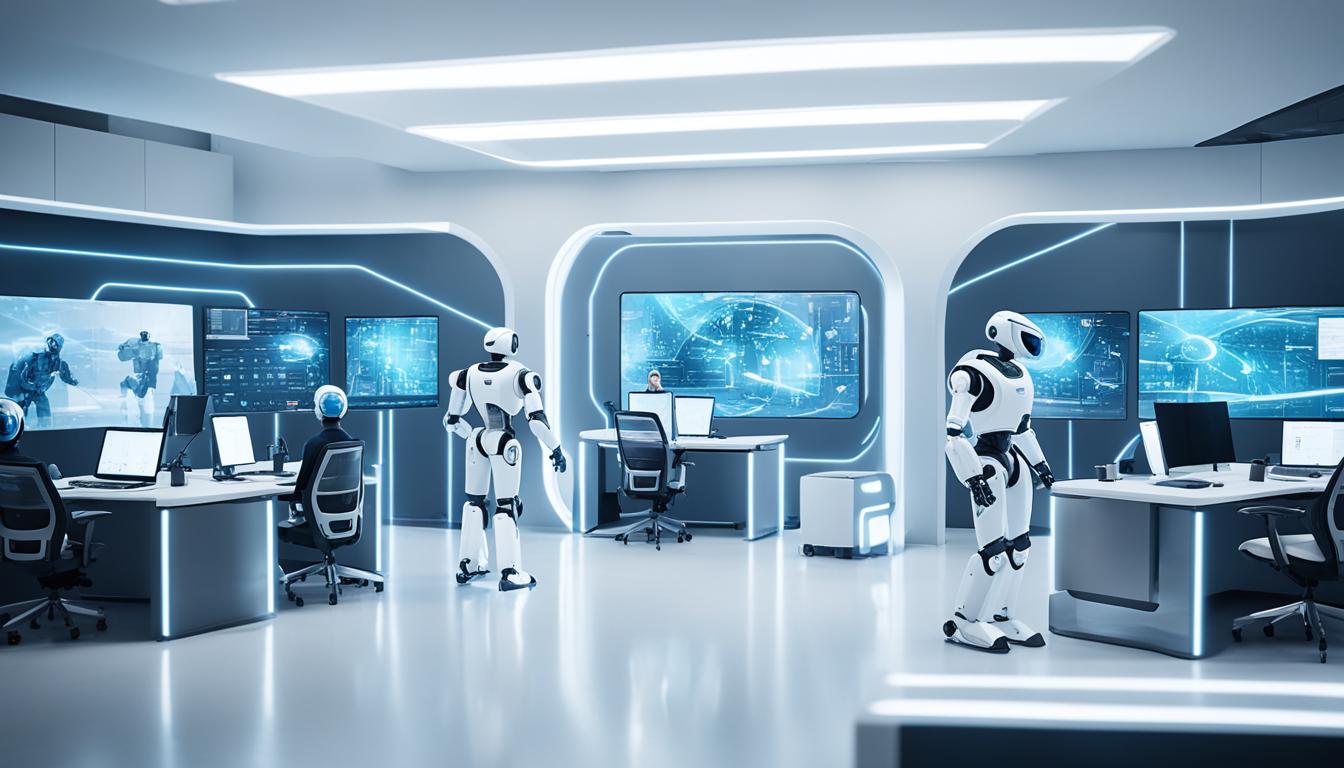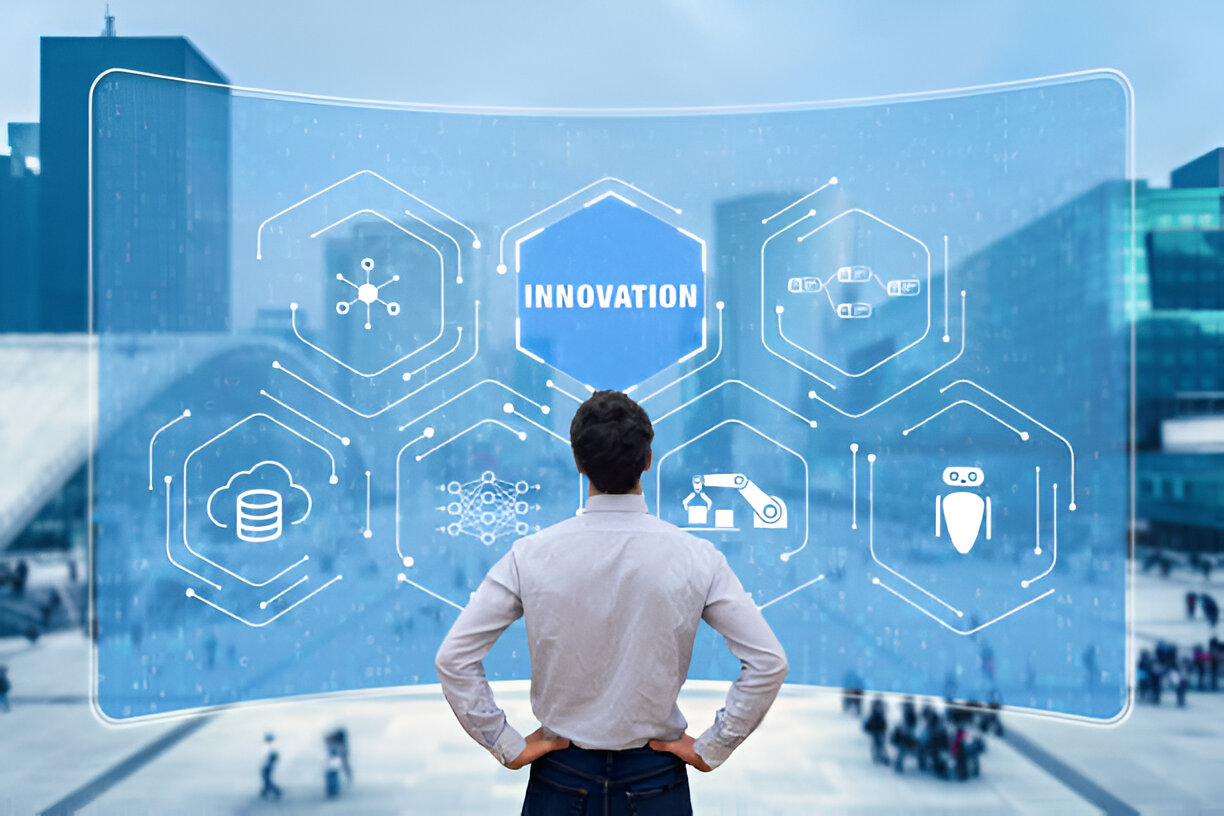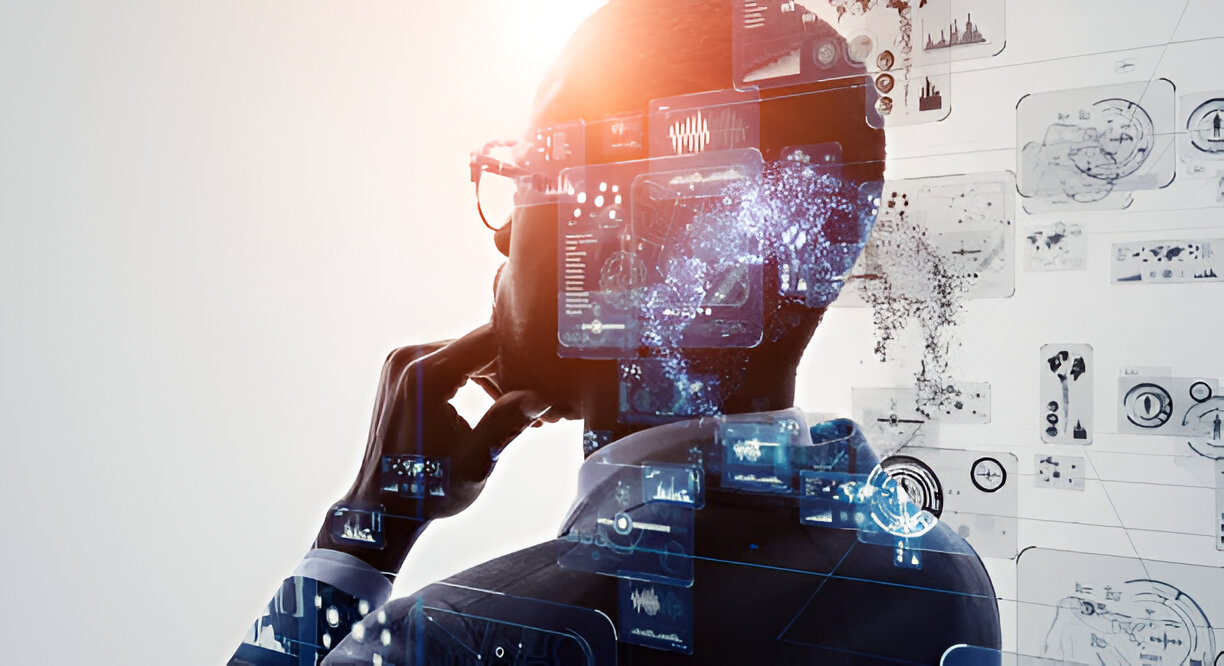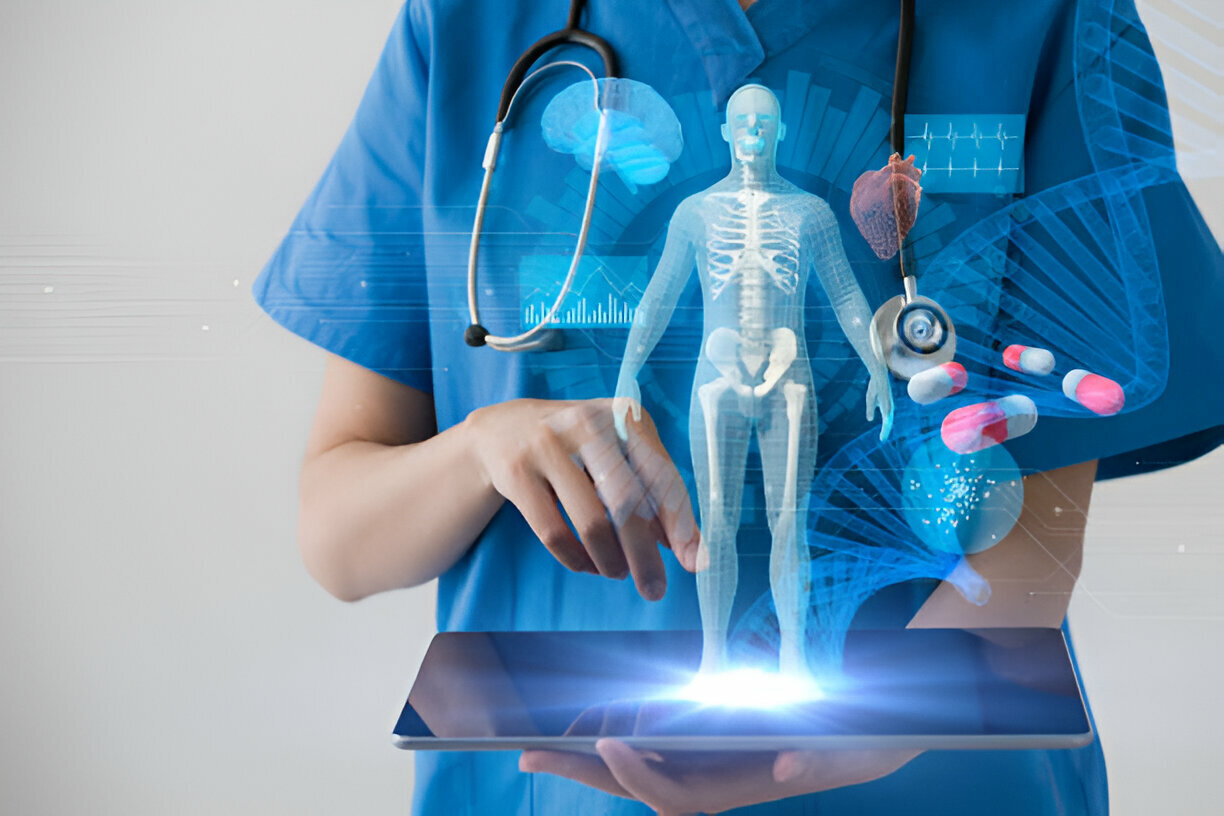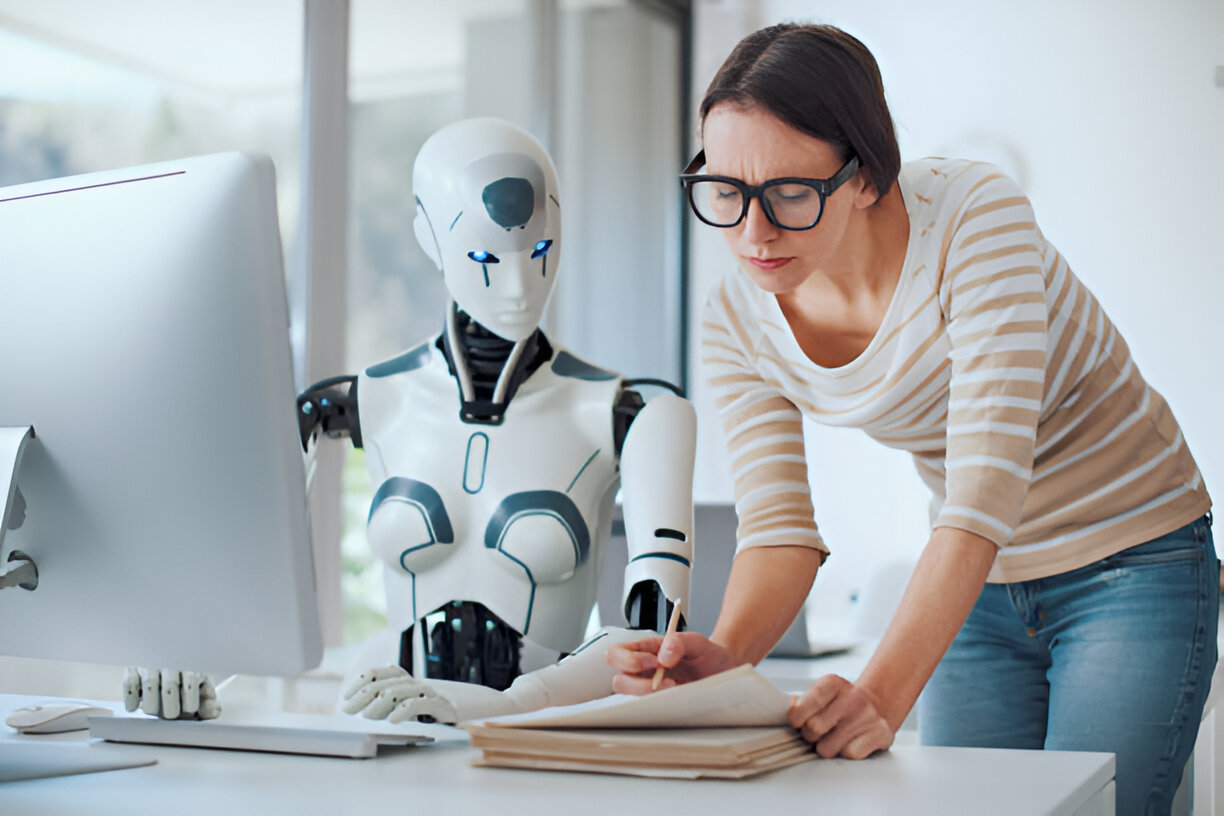AI is changing fast, making us wonder: how will it change work? A Goldman Sachs report says AI might replace 300 million full-time jobs worldwide. This shows how big an impact AI will have on jobs, making people both excited and worried.
AI is already changing jobs, making tasks easier and helping with big decisions. But what does this mean for our jobs and the skills we need in the future?
Key Takeaways
- AI could potentially replace the equivalent of 300 million full-time jobs globally, according to a Goldman Sachs report.
- AI is already automating repetitive tasks and boosting productivity in various industries.
- The integration of AI is transforming decision-making processes, enhancing customer experience, and fine-tuning operations.
- AI’s impact on the workforce is driving the need for reskilling and upskilling to adapt to the evolving job market.
- Responsible AI adoption and addressing ethical concerns are crucial as the technology continues to shape the future of work.
The Transformative Power of AI
Artificial Intelligence (AI) is now a key part of many industries, like healthcare and finance. It has made businesses more productive and efficient, cutting costs. As AI grows, it’s changing the future of work in big ways.
Automation and Job Displacement
AI can automate tasks that are repetitive and predictable. This has made things more efficient but has also worried people about losing jobs. The McKinsey Global Institute says by 2030, up to 14% of workers might need new careers because of AI.
Jobs that are routine are most at risk as AI does these tasks better and faster.
Reskilling and Upskilling for the AI Era
Companies are now focusing on teaching their workers new skills for the AI age. PwC is helping clients plan for the AI future, upskill workers, and use AI to improve recruitment and more. This change will keep happening as AI gets better, and PwC aims to help workers and companies keep up.

There’s a growing need for skills in AI, data science, and ethics. Workers need to learn new skills to do well in an AI world. Skills like thinking critically, being creative, and solving complex problems are more important than ever.
It’s important for schools, governments, and businesses to work together. They should focus on teaching AI skills and encouraging lifelong learning.
“Embracing change, investing in education, and fostering ethical AI development can lead to a future where humans and machines collaborate synergistically, shaping a more resilient and adaptable workforce.”
AI-Driven Workplace Innovation
Artificial intelligence (AI) is changing how we work and team up. It’s making the future of work exciting. AI is bringing humans and machines together, making work more efficient, productive, and creative.
Human-Machine Collaboration
AI can automate tasks that take up too much time, letting people focus on important work. For instance, AI can help new employees by guiding them through paperwork and suggesting learning materials. This makes starting a new job easier.
AI also gives insights into how employees feel and if they might be getting burned out. This helps companies support their workers better. It makes employees happier and work better.
The partnership between humans and machines is getting stronger. Advanced economies might face challenges with AI, but developing economies can adapt well. Women and those with more education will gain a lot from AI. But older workers might find it hard to keep up with new tech.
AI’s success comes from finding the right balance between automation and human skills. By using both, companies can improve processes, make better decisions, and have a happier workforce. This leads to growth and new ideas.
“The integration of AI into the workplace has the power to transform how we work, empowering employees and unlocking new levels of efficiency and creativity.”
Reimagining Business Operations with AI
AI is changing how businesses work, making things faster and smarter. By using ai-powered business operations, companies can work more efficiently and make quicker decisions. This leads to better productivity and agility.
Automated Processes
AI is great at automating tasks that take up too much time. It can handle things like HR, sales, and customer service, so people can focus on important tasks. This automated processes makes work easier and more consistent.
Faster, Better-Informed Decisions
AI can look through lots of data to find patterns we might miss. This helps leaders make faster decision-making without being clouded by biases. They get a clear view of their business.
| AI Application | Business Impact |
|---|---|
| Customer Support | Automated interactions, improved customer experiences, and predictive outcomes |
| Recruitment | Streamlined identification of skill sets, interview scheduling, and reduced bias in candidate shortlisting |
| Customer Analysis | Deeper understanding of customer preferences and more effective marketing strategies |
| Logistics | Optimized inventory management and route planning for shipments |
| Healthcare | Aided discovery of new treatments, patient progress analysis, and personalized treatment plans |
AI is getting better all the time, offering new ways to improve business. We’ll see self-driving cars, robots in factories, smart sensors, and quick disease diagnosis. Using ai-powered business operations will make things simpler and help solve big business problems.

Adding AI to business can boost finances or improve customer service in 18 months. Start with a few key areas for AI, then grow from there. Pick areas where AI can make a big difference, focusing on value and support.
To use AI well, companies need teams from different areas like business, digital, analytics, and IT. With good planning, companies can quickly develop and use AI. This opens up new ways to do business.
The AI Content Creation Revolution
AI is changing how we make and share content fast. It’s making videos look real and changing what we can do in many areas. This change is happening because AI tech is getting better and better.
AI is making a big impact on marketing and how companies talk to their customers. It helps make blog posts, social media, and even ads quickly and consistently. This makes the creative process faster and easier.

AI can’t always get the unique voice of a company right. But it helps with research and writing, letting marketers focus on other things. Still, it’s key to check the AI’s work to make sure it fits the brand and speaks to the audience.
Tools like OpenAI’s ChatGPT are getting popular fast. Companies are starting to use them in their work. As these tools get better, we’ll see more AI working together to do complex tasks. This will make things easier for customers and employees.
Using AI for making content could make businesses more productive and innovative. But, they need to be careful when using this tech. They must think about security and ethics to use it right.
“By late 2022, generative AI had captured significant attention from the public, with OpenAI’s ChatGPT showcasing the ability of these systems to respond to prompts with new content and ideas at remarkable speeds.”
The AI content creation revolution is happening now. Companies that use this tech wisely will get ahead in the fast-changing world of content marketing.
How will AI Change the Future of Work
AI is set to change the future of work in big ways. Studies show it will change job markets across many sectors. This will lead to both big changes and new chances. It’s important to understand how AI will affect the workforce and get ready for these changes.
One big worry is how AI might take jobs. PwC has looked into this and found that AI will automate some skills and jobs. The time frame and sectors will vary by country. This info helps PwC guide clients on upskilling their workers for the AI age.
But, AI also opens up new possibilities that could make our lives easier and bring many good changes. Forbes says AI can boost productivity, improve healthcare, and make education more accessible. These are just a few ways AI could change society now and in the future.
| Potential Impact of AI on Jobs | Percentage |
|---|---|
| Jobs that could be automated | 75 million |
| Jobs that could be augmented or transformed by AI | 10-13% worldwide |
| Jobs that could change due to AI | 427 million, or 13% worldwide |
| Jobs at risk of being automated | 2.3% worldwide |
| Jobs in low-income countries that could be replaced by bots | 0.4% |
| Jobs in high-income countries that could be replaced by bots | 5.5% |
These numbers show how big AI’s impact will be on the global workforce. There will be job losses and new chances. As AI gets better, it’s key for businesses, policymakers, and workers to work together. They should focus on making AI that works with humans and help create a workforce ready for the future.
“The future of AI brings endless possibilities and applications that will help simplify our lives to a great extent. AI has the potential to bring about numerous positive changes in society both now and in the future, including enhanced productivity, improved healthcare, and increased access to education.”
– Forbes
AI and the Gig Economy
The gig economy is changing fast with AI and machine learning. More people are working short-term jobs, and AI is making a big impact. About 12% of workers now do gig jobs, and AI is helping them a lot.
Empowering the Workforce
AI is changing how gig workers do their jobs. It makes them more efficient, accurate, and personalized. For example, Clearvoice uses AI to match workers with jobs, helping skilled people like writers find good work.
AI also gives smart tips, checks for mistakes, and helps workers learn new skills. This lets them keep up with changes in their field.
AI is making the gig economy better by making it fairer and more transparent. For instance, DRIFE uses AI to help riders pick the best drivers. AI marketing tools also help workers reach more people, letting them grow their careers.
The gig economy is getting bigger, with more Americans joining by 2027. AI is key to helping gig workers succeed. Experts think AI will create new jobs and make working in the gig economy better.
“AI is not replacing human workers but rather creating new job opportunities by speeding up manual and analog tasks.”
AI is changing the gig economy in many ways. It makes things more efficient, fair, and opens up new job chances. As the job market changes, using AI will be important for gig workers and the future of work.
Responsible AI Adoption
The AI revolution is changing many industries. Business leaders must be careful when adopting responsible ai adoption. AI has great potential but also raises ethical concerns. These concerns need to be tackled to make sure AI is used ethically and responsibly.
Addressing Ethical Concerns
Data privacy and the accuracy of AI-generated info are big worries. Devon Lovell, a People Partner at Fitzgerald HR, says, “What you put into ChatGPT is no longer yours, and there can be biases in the AI-generated content based on who uses it.” This highlights the need for strong data policies to use AI responsibly.
AI could also make biases worse and discriminate against some people. Business leaders must work on AI systems that are fair, clear, and answerable. This ensures they don’t make things worse for society.
As AI grows, companies must think about the good and bad sides of using it. They need to focus on ethics, talk to stakeholders, and understand AI’s effects. This balanced view is key to responsible ai adoption.
“The adoption of AI is estimated to boost global economic growth by $13 trillion by 2030, but it could also displace around 300 million jobs globally.”
Businesses should invest in good governance, training for employees, and partnerships with AI ethics experts. By tackling ethical concerns directly, companies can use AI’s power for good. This way, AI helps everyone in society.
Workforce Transformation Roadmap
The workforce is changing fast with new AI technology. It’s key for companies to make a future-ready workforce. This guide shows how to change your team for the AI age.
Embracing AI-Driven Automation
AI can take over many routine tasks. This frees up time for your team. Use AI tools to make things like payroll and onboarding easier. This lets your HR team focus on important tasks like managing talent and keeping employees happy.
AI can also spot risks like harassment and compliance issues. It helps track how happy employees are and if they plan to stay. This info helps you make smart choices and fix problems early.
Fostering Human-AI Collaboration
Even with AI, some tasks need a human touch. Creativity, empathy, and strategy are hard for machines. By working together, humans and AI can bring new ideas and make things run smoother.
AI can make many business tasks better. It cuts down on mistakes, makes things more accurate, and gives useful data. This leads to more work getting done, saving money, and staying ahead in the market.
Upskilling and Reskilling the Workforce
To keep your team ready for the future, focus on teaching new skills. Encourage learning in areas like data analysis and critical thinking. Offer online courses and mentorship to help them keep up.
Changing to a future-ready workforce is an ongoing effort. As AI gets better, companies must keep up. Make sure your team has the skills they need to handle new challenges.
| Key Statistics | Insights |
|---|---|
| AI can automate tasks like payroll and onboarding | This lets HR focus on important tasks |
| AI can spot risks like harassment and compliance issues | This helps take action early |
| AI can make businesses more productive | Employees can focus on customer support and strategy |
| Companies using AI can innovate and stay ahead | They get better processes and efficiency as AI grows |
By using AI, working together with AI, and teaching new skills, companies can change their teams for the AI future. This sets them up for success.
Conclusion
Artificial intelligence is changing the future of work in big ways. It can make business operations smoother and improve how we make decisions and do our jobs. But, it also raises concerns about job loss and the need for workers to learn new skills.
As AI becomes more common, companies must find a way to use it wisely. They need to help their workers adjust to the changes. This means using AI in a way that benefits everyone and prepares workers for the future.
Using AI at work brings both good and bad sides. We need everyone to work together to make the most of it. By focusing on the benefits of artificial intelligence and the growth of the workforce, companies can thrive in the changing future of work. This future is shaped by fast-moving automation.
FAQ
How will AI impact the future of work?
A report by Goldman Sachs says AI might replace 300 million full-time jobs. It also notes that two-thirds of jobs in the U.S. and Europe could be at risk from AI. About a quarter of all jobs might be fully taken over by AI.
What are the concerns about job displacement due to AI and automation?
The McKinsey Global Institute predicts that by 2030, 14% of employees worldwide might need new careers due to AI. It’s vital to reskill and upskill workers for the AI age.
How can businesses leverage AI to streamline their operations?
AI can automate tasks that take up too much time, letting businesses focus on important work. For instance, it can make onboarding new hires easier by handling paperwork and guiding them through their first steps.
How can AI support business decision-making?
AI can sift through huge amounts of data to find patterns that are hard to see. This helps leaders make fast, informed decisions without being clouded by biases.
How can AI be used in content creation?
AI can make creating content easier by automating tasks like writing blogs, social media posts, and more. It’s not perfect but can help with research and ideas, freeing up marketers for other tasks.
What skills do workers need to thrive in the AI era?
To stand out in AI-focused jobs, workers should improve their technical skills, take online courses, and understand their industry. Getting work experience and honing soft skills is also key.
What are the concerns around the responsible adoption of AI?
Worries include data privacy, integrity, and the trustworthiness of AI-created info. Companies must weigh the pros and cons of using AI carefully.
How can organizations prepare their workforce for the AI era?
PwC is helping clients plan for the AI future by figuring out who needs upskilling and how. They’re also launching programs to improve employee skills and use AI to enhance recruitment, performance, and more.
